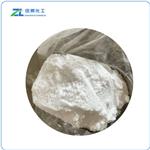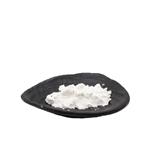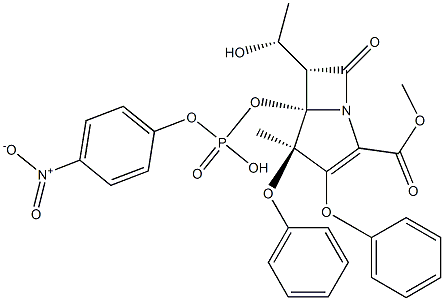Proteinase K: A Versatile Enzyme for Isolation of Amyloid Cores
Jan 31,2024
General Description
Proteinase K is a versatile serine protease that plays a crucial role in cleaving peptide bonds within proteins. Its mechanism of action involves binding to the substrate, undergoing activation, and cleaving peptide bonds specifically on the carboxylic acid side of aromatic, aliphatic, or hydrophobic amino acids. It can also cleave peptide bonds on the amide side of glycine residues. Proteinase K is commonly used for the isolation of amyloid cores due to its resistance to destruction by amyloids and prions. It offers advantages such as tolerance to a wide range of reaction conditions and low amino acid specificity, allowing for efficient hydrolysis of non-core regions in amyloid proteins. This enzyme has greatly contributed to our understanding of amyloid structure and function in diseases like Alzheimer's and Parkinson's.

Figure 1. Proteinase K
Mechanism of Action
Proteinase K is a serine protease that plays a crucial role in cleaving peptide bonds within proteins. Its mechanism of action involves several distinct steps. Firstly, Proteinase K binds to the protein or nucleic acid substrate through non-specific hydrophobic interactions. This initial binding allows the enzyme to interact with its target molecule effectively. Once bound, the enzyme undergoes an activation step, where a specific serine residue becomes catalytically active through the involvement of a histidine residue and a water molecule. This activation process leads to the formation of an active site, which is responsible for cleaving peptide bonds. During the cleavage step, the active site of Proteinase K specifically targets and breaks the peptide bond on the carboxylic acid side of amino acid residues containing aromatic, aliphatic, or hydrophobic amino acids. Additionally, it can also cleave peptide bonds on the amide side of glycine residues. Finally, after cleavage occurs, the products of the reaction, which are peptides, are released from the enzyme. One notable characteristic of Proteinase K is its ability to function under harsh conditions, such as high temperatures and in the presence of detergents. This feature makes it particularly useful in various applications, including DNA extraction, protein analysis, and molecular biology research. 1
Key Enzyme for Isolation of Amyloid Cores
Proteinase K is an enzyme that is widely used for the isolation of amyloid cores. It is a serine endoprotease that was originally isolated from the fungus Engyodontium album. Proteinase K is commonly used as a preparative reagent for the destruction of proteins, including DNAses and RNAses, in DNA and RNA preparations. However, its increased resistance to Proteinase K has proved to be a general property of prions and amyloids, making it an ideal candidate for their detection and isolation. Proteinase K digestion has revealed that different structural variants of amyloids can differ in size, location and other features, which allowed researchers to distinguish between these variants and study the relation between their structure and phenotype. Therefore, Proteinase K is considered the key enzyme for the isolation of amyloid cores. Its ability to specifically target and digest amyloid proteins has greatly contributed to our understanding of their structure and function. Proteinase K is a valuable tool for researchers working on diseases related to amyloid formation, including Alzheimer’s disease, Parkinson’s disease, and type 2 diabetes. 2
Advantages and Specificity in Amyloid Core Isolation
Proteinase K is an enzyme that offers several advantages and a unique specificity in the isolation of amyloid cores. One of its key advantages is its tolerance to a wide range of reaction conditions. It remains active over a broad pH range of 4 to 12, and it can even be enhanced by protein denaturants like guanidine, urea, and strong detergents such as SDS or Sarcosyl. However, the most significant advantage of Proteinase K over other proteases lies in its low amino acid specificity. This characteristic allows for nearly complete hydrolysis of non-core regions in amyloid proteins. Although there have been contradictory findings regarding Proteinase K's specificity, recent studies have demonstrated that Proteinase K exhibits almost no specificity in terms of residue cleavage. For instance, analysis of PROTEINASE K digestion fragments from the yeast Sup35 prion revealed that the ends of these fragments did not show significant residue specificity. Almost all residues were found at the C-termini or preceded the N-termini, except for proline, which Proteinase K never cut after or before. Similar observations were made with in vitro assembled amyloids of other yeast prion proteins like Ure2 and PrP. These findings suggest that the earlier contradictory data on Proteinase K specificity may have been influenced by the nature of the substrates used in the experiments. Previous studies primarily utilized short artificial peptides rather than full-length proteins, which might have led to different results. In conclusion, the advantages of Proteinase K in isolating amyloid cores include its tolerance to various reaction conditions and its low amino acid specificity, allowing for efficient hydrolysis of non-core regions. Its versatility makes it a valuable tool in amyloid research. 3
Reference
1. An Introduction to Proteinase K and Its Applications-WHAT IS THE PROTEINASE K MECHANISM OF ACTION? Sigma Aldrich.
2. Silva CJ, Vázquez-Fernández E, Onisko B, Requena JR. Proteinase K and the structure of PrPSc: The good, the bad and the ugly. Virus Res. 2015;207:120-126.
3. Kushnirov VV, Dergalev AA, Alexandrov AI. Proteinase K resistant cores of prions and amyloids. Prion. 2020;14(1):11-19.
- Related articles
- Related Qustion
- What is Proteinase K? Oct 23, 2023
Proteinase K is a medium-sized globular α/β protein and widely used in molecular biology
Pyraziflumid is synthesised using ethyl 4,4,4-trifluoro-3-oxobutanoate as a raw material by chemical reaction.....
Jan 31,2024Antimicrobial agentMuscone enhances angiogenesis, neuronal growth, memory, and shows potential for spinal cord injury treatment due to its anti-inflammatory and neuroprotective properties.....
Feb 1,2024APIProteinase K
39450-01-6You may like
- Proteinase K
-

- $6.00 / 1kg
- 2024-05-24
- CAS:39450-01-6
- Min. Order: 1kg
- Purity: More than 99%
- Supply Ability: 2000KG/Month
- Proteinase K
-

- $99.00 / 1kg
- 2024-05-08
- CAS:39450-01-6
- Min. Order: 1kg
- Purity: 99%
- Supply Ability: 20ton
- Proteinase K
-

- $6.00 / 1KG
- 2024-04-23
- CAS:39450-01-6
- Min. Order: 1KG
- Purity: More than 99%
- Supply Ability: 2000KG/Month





